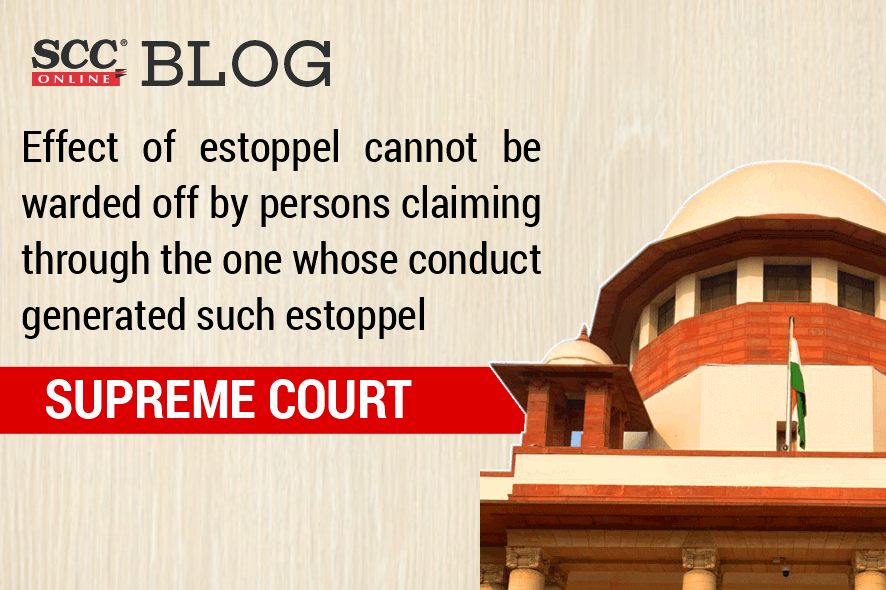Supreme Court: In a civil appeal against the Madras High Court’s denial of appellants’ entitlement in the suit property on account of the release deed executed by their father, the bench of K.M. Joseph∗ and Hrishikesh Roy, JJ. held that the effect of principle of estoppel cannot be warded off by persons claiming through the person whose conduct generated such estoppel. The Court found the present appeal bereft of any merit and dismissed the matter.
The present matter pertains to the self-acquired property of ‘X’ who married twice. ‘Z’ was born to X from his first marriage, who pre-deceased his father in 1978, while X died in 1988. Z had executed a relinquishment, having received valuable consideration in return. The present matter relates to a suit for partition of property filed by two of X’s children born from second marriage. The Trial Court found the release deed to be a void document, since it was executed by Z in 1975, when his father was still alive. On the other hand, the High Court relied on Gulam Abbas v. Haji Kayyum Ali, (1973) 1 SCC 1 and found that the appellants were not entitled to claim any share in the property. The appellants, being aggrieved by the High Court’s view, approached the Court through the present matter.
The Court examined Section 6 of Transfer of Property Act, 1882 which enumerates transferable properties and Section 6(a) which declares that a chance of an heir apparent succeeding to an estate, the chance of a relation obtaining a legacy on the death of a kinsman or other mere possibility of a like nature cannot be transferred. The Court commented that a living man has no heir, and the person who may become an heir and entitled to legally succeed upon the death of his relative would not have any right until succession to the estate is opened.
The Court noted that when X was alive, Z at best had a spes successionis, i.e., the possibility of succeeding in a property after X’s death. And that, the Hindu law does not grant a right by birth in case of a separate property. Z would have acquired rights in the said property, only if his father would have died intestate. Thus, in the Court’s opinion, the release deed may not affect transfer of rights in favour of X or anyone else.
The Court examined the following issues while dealing with the present matter:
-
Is it a case where the doctrine of equitable estoppel would have prevented Z from staking a claim if he had survived his father?
-
What is the effect of the existence of estoppel as against Z if such estoppel is made out, as far as the claim of the appellants is concerned?
-
What is the effect of Section 8 of Hindu Minority and Guardianship Act?
The Court analysed Gulam Abbas v. Haji Kayyum Ali, (1973) 1 SCC 1, wherein, sons of the deceased had paid the debts of their father while he was alive and acknowledged receipt of some property as consideration for not claiming any future rights. The Court in the aforementioned case held that “if the expectant heir goes further and receives consideration and so conducts himself as to mislead an owner into not making dispositions of his property inter vivos, the expectant heir could be debarred from setting up his right when it does unquestionably vest in him.”
The Bench observed that transfer of rights by an heir apparent being mere spes successonis is ineffective to convey any right. Thus, no transfer took place by mere execution of release deed. The Court added that “however, if his conduct was such that he could be estopped, then the execution of the release deed would imperil his right and therefore cast an irremovable shadow on the claim of the appellants as well.”
The Court said that “the words in the ‘Release Deed’ that hereafter he did not have any other connection except blood relation appears to signify X’s intention to deny any claim to Z regarding the property. He apparently thought that he achieved his goal and in law if the principle in Gulam Abbas (supra_) is applied and Z did not pre-decease his father, all would have gone according to the plan of the parties.” The Bench pressed on the fact that X did not execute any document by way of Will, which reflected that he proceeded on the basis that the branch represented by Z was being cut off from inheritance from the suit property.
The Court also examined the provisions under Section 8 of Hindu Minority and Guardianship Act, 1956 regarding powers of a natural guardian and noted that the appellants did not have any right in the suit property at the time of birth or at the time when Z or X died.
Thus, the Court held that the effect of the estoppel cannot be warded off by persons claiming through the person whose conduct has generated the estoppel, which applies without any distinction based on religion. Thus, the Court did not find any merit in the appeals and dismissed the present matter.
[Elumalai@Venkatesan v. M. Kamala, 2023 SCC OnLine SC 84, decided on 25-01-2023]
*Judgment authored by: Justice K.M. Joseph
Advocates who appeared in this case :
For Appellants: Advocate Sidharth Iyer;
For Plaintiffs: Advocate Umashankar;
For Defendants: Senior Counsel Jayanth Muth Raj.






